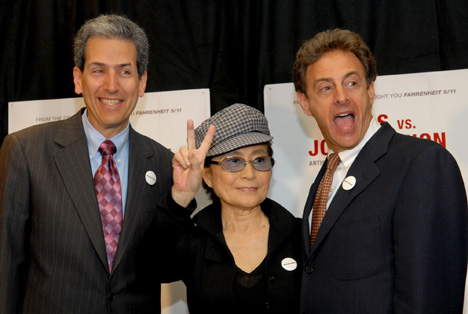Lennon’s life, legacy depicted in documentary

Yoko Ono Lennon poses with filmmakers David Leaf, left, and John Scheinfeld after talking about their new film “The U.S. vs. John Lennon” during a press conference at The Regency Hotel Wednesday in New York. The documentary played at the Toronto Film Fest The Associated Press
Sep 12, 2006
John Lennon joked that since he was a schoolboy he’d always gotten into trouble, maybe because he just had a look about him.
Eventually he got into trouble with the U.S. government.
The ex-Beatle’s celebrated battle with the Feds is chronicled in “The U.S. vs. John Lennon,” a documentary tracing how he went from rock star to fierce anti-war protester to “undesirable alien.”
The film was made with the cooperation of Lennon’s widow, Yoko Ono, who said the film is a rich and authentic portrait of the man and what he was fighting for.
“Basically, if you want to know about John, this is John,” Ono told The Associated Press at the Toronto International Film Festival, where the documentary played in advance of its theatrical debut Friday.
Get The Daily Illini in your inbox!
Directors David Leaf and John Scheinfeld were able to mine archival recordings and family photos provided by Ono.
They were able to secure rights to use about three dozen Beatles and Lennon songs in the film’s soundtrack, including “Revolution,” “All You Need Is Love,” “Imagine” and “Give Peace a Chance.”
The film also features extensive new recollections from Ono, who gradually warmed up to the filmmakers after initial suspicions.
“I’m always skeptical because I’m responsible for the image of John and all that, and I just don’t want to make a mistake,” Ono said. “Quite often, people approach me and they say one thing, then they do the other, so I was very cagey about it at the beginning. But they did a very good job with the music to make sure the music is right. I felt it was a very classy film.”
The materials Ono provided gave the film a wealth of previously unseen images and recorded comments by Lennon.
He becomes almost the narrator of his own story.
“What we discovered going through there is that it was, in essence, the John and Yoko reality show,” Scheinfeld said. “They documented their daily life. There was often a camera around, often a microphone around. She saved it, so we were able to find a lot of those great moments that helped us tell the story.”
The film opens with Lennon’s appearance at a 1971 concert to free John Sinclair.
Sinclair had been in prison for two years for selling marijuana to undercover police.
Lennon wound up under FBI surveillance as he began hanging out with such counterculture radicals as Bobby Seale, Jerry Rubin and Abbie Hoffman.
He also considered headlining a concert tour to help bring out the vote against President Nixon’s re-election.
The Nixon administration’s response was to sic the Immigration and Naturalization Service on Lennon.
They sought to deport him, ostensibly because of a drug conviction in England.
The filmmakers trace Lennon’s development from flippant bad boy, who drew the wrath of fans when he remarked that the Beatles were more popular than Jesus, to a key spokesman against the Vietnam War, whose colorful tactics included “bed-ins” with Ono to promote peace.
Critics mocked him, calling his antics silly, idealistic stunts that would have no practical results.
Yet Lennon kept at it with passion and humor.
“We’re selling it like soap, you know?” Lennon says in footage of one of the bed-ins. “And you’ve got to sell and sell until the housewife thinks, `Oh, there’s peace and war. That’s the two products.'”
On a talk show, Lennon discussed the “War Is Over” billboards he and Ono put up in major cities around the world, the slogan taken from a refrain of their hit song “Happy Xmas (War Is Over).”
Lennon related that people would ask how much the billboards cost him.
His response: “I don’t know, but it’s cheaper than somebody’s life.”
The documentary presents Nixon and his administration as wildly out of touch with the peace movement.
It fixated on Lennon, with his anthem “Give Peace a Chance,” as a ringleader who needed to be silenced.
The filmmakers interview Nixon critics and allies to show how fearful the White House was over Lennon’s influence and how contemptuous the administration was toward anti-war activists.
“`Give Peace a Chance.’ Who can be opposed to that? The administration was,” says George McGovern, the Democrat who lost the 1972 presidential race to Nixon.
“That is a frightening voice for people who want to hear `The Battle Hymn of the Republic’ over and over again,” says author Gore Vidal.
Former Nixon henchman G. Gordon Liddy recalls an encounter he had during a candlelight vigil held by peace demonstrators.
Liddy walked up to a protester, took his candle, lit his cigar and told the activist, “There, you’re useful for some purpose.”
The film goes on to examine Lennon’s happy last years in New York before he was gunned down in 1980.
Lennon won his immigration case in 1975, on his birthday, and also the day son Sean was born.
Ono said she sees signs that today’s artists are following Lennon’s lead and speaking out against what they see as government injustice, such as the Dixie Chicks’ profession of shame that President Bush comes from their home state of Texas.
The fallout faced by the country trio is chronicled in another Toronto festival documentary, “Dixie Chicks: Shut Up and Sing.”
What would Lennon think about the state of the world today, with the United States in another unpopular war?
“It’s a very tense time now,” Ono told the AP, “but I think he would have said, `I told you so.'”





